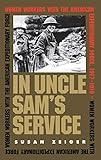In Uncle Sam's Service : Women Workers with the American Expeditionary Force, 1917-1919 / Susan Zeiger.
Material type: TextPublisher: Ithaca, NY : Cornell University Press, [2019]Copyright date: ©2000Description: 1 online resource (224 p.) : 16 halftones, 4 tablesContent type:
TextPublisher: Ithaca, NY : Cornell University Press, [2019]Copyright date: ©2000Description: 1 online resource (224 p.) : 16 halftones, 4 tablesContent type: - 9780801431661
- 9781501744952
- 940.4/082 22
- D639.W7
- online - DeGruyter
- Issued also in print.
| Item type | Current library | Call number | URL | Status | Notes | Barcode | |
|---|---|---|---|---|---|---|---|
 eBook
eBook
|
Biblioteca "Angelicum" Pont. Univ. S.Tommaso d'Aquino Nuvola online | online - DeGruyter (Browse shelf(Opens below)) | Online access | Not for loan (Accesso limitato) | Accesso per gli utenti autorizzati / Access for authorized users | (dgr)9781501744952 |
Browsing Biblioteca "Angelicum" Pont. Univ. S.Tommaso d'Aquino shelves, Shelving location: Nuvola online Close shelf browser (Hides shelf browser)

|

|

|

|

|

|

|
||
| online - DeGruyter Rural Democracy : Family Farmers and Politics in Western Washington, 1890-1925 / | online - DeGruyter Participant Observer : An Autobiography / | online - DeGruyter Dionysus Writes : The Invention of Theatre in Ancient Greece / | online - DeGruyter In Uncle Sam's Service : Women Workers with the American Expeditionary Force, 1917-1919 / | online - DeGruyter Governing Ideas : Strategies for Innovation in France and Germany / | online - DeGruyter American Industry in International Competition : Government Policies and Corporate Strategies / | online - DeGruyter Andrew D. White : Educator, Historian, Diplomat / |
Frontmatter -- Contents -- Acknowledgments -- Introduction -- 1. Mobilizing Women For War -- 2. Getting Over There: A Social Analysis Of Women's Enlistment -- 3. Serving Doughnuts To The Doughboys: Auxiliary Workers In France -- 4. "The Stenographers Will Win The War": Army Office Workers And Telephone Operators -- 5. "Compassionate Sympathizers And Active Combatants": Army Nurses In France -- 6. Serving Uncle Sam: The Meaning Of Women's Wartime Service -- Notes -- Index
restricted access online access with authorization star
http://purl.org/coar/access_right/c_16ec
During World War I, the first American war in which women were mobilized on a mass scale by the armed services, more than sixteen thousand women served overseas with the American Expeditionary Force. Although wealthy women volunteers-members of the so-called'heiress corps'-monopolized public attention, Susan Zeiger reveals that the majority of AEF women were wage-earners. Their motives for enlistment ranged from patriotism to economic self-interest, from a sense of adventure to a desire to challenge gender boundaries. Zeiger uses diaries, letters, questionnaires, oral histories, and memoirs to explore the women's experience of war. She draws upon insights from labor history, political history, popular culture, and the study of gender and war to analyze the ways in which women's wartime service heightened and made visible the contradictions in the prevailing gender relations. Zeiger argues that the interests of AEF women clashed with those of the wartime state at a crucial historical moment. Women sought to expand their personal opportunities for mobility and professional success and lay claim to equal citizenship. The government, determined to contain the disruption to the status quo, created a separate, subordinate status for women in the military,'domesticating'women's service and reinscribing it within conventional limits.
Issued also in print.
Mode of access: Internet via World Wide Web.
In English.
Description based on online resource; title from PDF title page (publisher's Web site, viewed 02. Mrz 2022)


